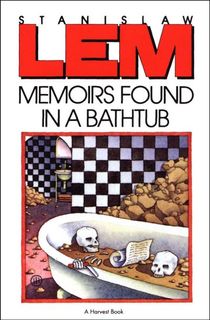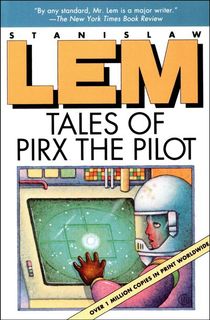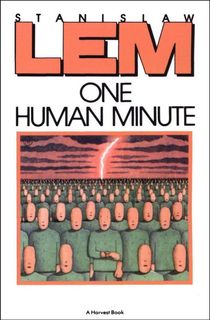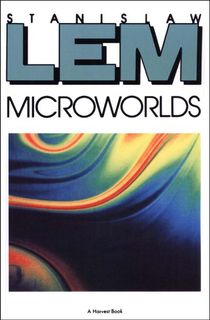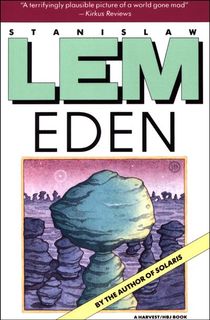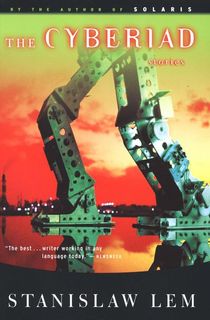A revolutionary writer of speculative fiction, Stanislaw Lem left an impact on readers and scholars alike. Over 27 million copies of his work have been sold, and his writing has been translated from his native Polish into at least 40 languages. Lem's impressive body of work explores themes like technology, alien intelligence, human limitations, and our species' place in the universe. An influential writer with a sharp eye for analysis and an unforgettable sense of humor, Lem's presence continues to be felt, even years after his passing. We have compiled a list of fascinating facts about Stanislaw Lem to shed a little more light on this talented writer.
1. When he was young, he planned to go into medicine.
Lem initially planned to follow in his father’s footsteps and become a laryngologist. After boarding school he wished to enroll in Lwow Polytechnic but was not allowed—it was during the Soviet invasion and occupation of Eastern Poland. However, he was accepted to study medicine at Lwow University due to his father’s connections. In 1941, Lem was still a medical student when the Nazis invaded the Soviet Union. Because of his Jewish ancestry, Lem and his family were in jeopardy, so he was forced to drop out.
In 1945, Lem was able to resume his medical studies at Kraków's Jagiellonian University He did not take his final examinations on purpose, to avoid military service, but did receive absolutorium—the completion of studies without a diploma. Because of this, Lem was obligated to work monthly at a hospital, specifically the maternity ward; the sight of blood was one of the reasons Lem ultimately dropped medicine. During his college years, Lem started to write stories.
2. He loved cars!
After Lem was forced to drop out of college, he became a car mechanic to earn a living. He was able to gain his driver’s license before the outbreak of World War II, but never had the opportunity to fully take advantage of it. He was able to drive some cars, but because he was living in Poland during the Communist regime, Lem only drove a few models. He always enjoyed speaking on the subject and worked on his cars himself.
3. Lem sent his protagonists on great adventures.

From 1956-1968, Lem wrote everything from science fiction novels to essays on science and culture. While his works featured the infinite space, Lem refused to ever leave his home and country. Sławomir Mrożek—a Polish writer and Lem’s close friend—even tried to convince Lem to travel to the U.S. on a scholarship in order to grow his career, but Lem refused on the pretense that he didn’t speak English well. Similarly, Professor Jerzy Jarzębski tried to convince Lem to move to Stockholm, but his attempts were unsuccessful.
While Lem stayed at home, he sent his characters soaring into the vast universe. Such is the case in Tales of Pirx the Pilot, which follows Pirx during his adventures in a futuristic Occidental world. The book is set somewhere in the 21st or 22nd centuries, after mankind has started to colonize our solar system and explore other universes. The multifaceted Pirx—who wears many hats as a pilot/cadet/captain of a merchant spaceship—often finds himself in extreme situations as he travels between Earth, the Moon, and Mars. Unlike other traditional heroic space pilots, Pirx is an average working man who simply overcomes most situations with the use of common sense and luck. However, Pirx’s adventures are quite exceptional for the average man. With adventures like that, Pirx traveled enough for himself and Lem!
RELATED: Sci-Fi Grand Master Joe Haldman Talks Adaptation and Simulation
4. Lem had a big sweet tooth.
Lem was a big enthusiast of sweets and desserts. He was especially a fan of halva and chocolate-covered marzipan. Halva is a West Asian dense confection sweetened with either sugar or honey. Meanwhile, marzipan is a widely-used confection that consists of sweeteners and almond meal. Towards the end of his life, Lem fell ill with diabetes. Tomasz Lem—son of the writer—revealed that after Lem’s death, a pile of tinfoil wrappers that reached the ceiling were discovered behind his bookshelves.
5. Lem was an atheist, and was wary of humanity's relationship to technology.
Lem once claimed to have been raised Roman Catholic, but went to Jewish religious lessons as a child. It was during the Nazi occupation that Lem recognized his Jewish roots in a way he hadn’t before, through the dangers his family faced, and their tactics for survival—they used false papers to avoid imprisonment in a ghetto. Later Lem became an atheist for moral reasons. In a 1984 interview "Two Ends of The World" for The Missouri Review, Lem explained his belief that “the world is constructed awfully, so I want to believe it wasn’t made by anybody.” In his later years, Lem considered himself an agnostic and an atheist.
Another contradiction in Lem’s life was his relationship with technology. Science fiction and technology just go hand in hand. However, Lem didn’t allow technology to infiltrate his everyday life. He never learned to use a computer, instead remaining faithful to his typewriter. Lem was quite critical of technological advancements, and their effect on humanity. His collection of essays in One Human Minute provides Lem’s reflection on the evolution of humans; he produces a fascinating snapshot of the occurrences within the planet in sixty-second span. He delivers everything from philosophical pieces about cosmology and the pervasiveness of computers, to lighthearted reviews on impossible titles and books that never existed.
6. He was a polyglot.

Lem's books have been translated into 41 languages. From the 1950s to the 2000s, he published books in both the science fiction and philosophical/futurological genres, and sold over 45 million copies. Lem also knew seven languages: Polish, German, English, French, Ukrainian, Russian, and Latin (which he learned in medical school).
7. He didn't consider himself a science fiction writer.
Considered one of the world’s most celebrated science fiction writers, Lem sometimes ridiculed his own genre! A clear instance was in Lem's novel His Master’s Voice, in which the protagonist Hogarth tries to read science fiction stories in the hopes of coming up with new ideas, but instead dismisses them as “pseudo-scientific fairy tales.” Some of Lem’s remarks on science fiction writers did not sit well with American writers. Lem was dismissed from the Science Fiction and Fantasy Writers of America, or SFWA, although it was later discovered that the comments were taken out of context and badly translated.
Lem was adamant about his resistance to being considered a science fiction writer. In Microworlds—his provocative collection off essays—Lem’s sharp eye provides a bold and controversial analysis of the genre that made him famous: science fiction. The collection consists of ten essays that examine not only Lem’s biographical and literary history, but also focus on his fellow authors and their works. Lem includes various influences and elements of science fiction while also speaking about topics like Philip K. Dick, cosmology, time travel, and Jorge Luis Borges.
RELATED: 10 Hilarious Douglas Adams Quotes
8. He was critical of his book Eden.
Lem's works are regarded as some of the greatest in speculative fiction. His writing was always ambitious, predicting the future while providing philosophical anecdotes about technology and humanity. But Lem was critical of his own work, and had a particularly unflattering view of his novel Eden.
He felt the book could not compare to his other work, and that its characters and the universe he created were “flat and one-dimensional.” He did believe that the novel was better than average science fiction novels, but that his other works outshined his first project. However, many scholars and researchers consider the novel to be influential for its exploration of the possibility of alien life. Eden is a dystopian work, following a six-man crew that crash lands on Eden, the fourth planet from another sun. It features an extraterrestrial civilization that lives surrounded by images of death. The crew attempts to communicate with the civilization, which is widely different from our own.
9. He dreaded movie adaptations!
Like many famous writers, Lem’s literary works have been adapted for the silver screen. But many of the film adaptations were not well received by the Polish writer. For example, he was quite vocal about his disdain of the 1960 East German/Polish production of First Spaceship on Venus. He was also glad that many people forgot the adaptation of his novel The Astronauts. He did remain positive about the one good thing that came out of the film. In an interview, he claimed "The only up side of making this flop was the opportunity to visit West Berlin.” He also voiced his dissatisfaction with the 1972 picture Solaris directed by Andrei Tarkovsky. Among other objections, the writer was discouraged by the director’s decision to expand the prologue.
Lem didn’t hate all the adaptations of his works. He actually enjoyed Andrzej Wajda’s Layer Cake from 1968, possibly because Lem himsef wrote the script himself and was able to follow the making of the film. The film was based on Lem’s short story entitled “Do You Exist, Mr. Jones?” Some of Lem's favorite movie and TV included King Kong, the James Bond series, and Star Wars. He did enjoy the Star Trek TV series but criticized the show's disregard for the basic laws of physics.
10. Lem predicted the future!
Lem made some extraordinary predictions about our current technology, including tablets, smart phones, and even Google! For example, in his novel The Cyberiad Lem offered some innovative ideas such as 'smart dust'—a swarm of tiny drone computers, no larger than grains of sand, that operate as a massive parallel-processing computer system. Something much like Lem’s idea has recently been achieved through nanotechnology.
In the same novel, Lem also concocted the idea of an “electronic bard,” a computer device that is capable of writing poetry. It is similar to the experimental poetry-writing algorithms that are found online. If you’re looking for an experience inspired by Lem’s electronic bard, you should visit the Warsaw Copernicus Science Centre, where robots do dramatic performances based on Lem and other authors.
This post is sponsored by Open Road Media. Thank you for supporting our partners, who make it possible for The Portalist to continue publishing the sci-fi stories you love.
[via The Paris Review, The New York Times, and Culture Pl]
Featured photo: Wikimedia Commons

